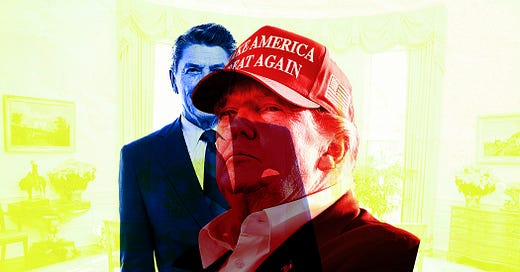No, Trumpism Can’t Be Fused with Reaganism
Unless you’re willing misrepresent one or the other.
We Win, They Lose
Republican Foreign Policy and the New Cold War
by Matthew Kroenig and Dan Negrea
Republic, 220 pp., $29.95
FOR THE PAST THREE YEARS, former Trump administration officials have been living in a kind of exile. Having lost their government posts, many sought refuge in Washington think tanks, biding their time for a return of their man (and, hopefully, a return of their own to new and more high-ranking jobs). For many of them, a primary endeavor is planning for Donald Trump’s second term, which could commence in ten months.
Thus, we have the Heritage Foundation’s Project 2025, drafted by a coterie of former officeholders, which offers a comprehensive set of proposals ranging from mass deportations of migrants to a radical overhaul of the civil service and the Department of Justice so that both will better work the will of the White House.
Now there is another entrant in this game.
Over at the Atlantic Council, two former midlevel Trump national-security officials, Matthew Kroenig and Dan Negrea, have been crafting a foreign policy doctrine for Trump’s second coming, which they are promoting in a new book, We Win, They Lose. Festooned with a glowing preface from Mike Pompeo, Trump’s CIA director and secretary of state, and bashing every aspect of President Joe Biden’s national security policies along the way, Kroenig and Negrea seek to merge “the traditions of Reaganism with the innovations of Trumpism” to forge what they call a “Trump-Reagan fusion” in foreign affairs.
The authors acknowledge that such a fusion might seem like an “oxymoron given that these men’s personalities and worldviews are so different,” but it turns out, they argue, that the two presidents had more in common with each other than is generally thought. Neither Reagan nor Trump was a product of Beltway politics. Both started out as Democrats and became Republicans. Both starred as entertainers. Both were widely regarded as unserious and even reckless. Always underestimated, the two “have been the most influential Republican presidents of the past several decades, and any viable GOP foreign policy must necessarily build on both presidents’ legacies.”
Ranging over every geopolitical flashpoint across the globe, Kroenig and Negrea offer one example after another of what a Trump-Reagan fusion would look like.
The beginning of wisdom in all potential zones of conflict, they write, is the maxim of “peace through strength,” which both Reagan and Trump not only appreciated but put into action, engaging in sustained military buildups. With respect to regional conflicts, Trump, like Reagan, “was skeptical of drawn-out American military interventions with no clear resolution in sight,” and sought to bring an end to U.S. military missions in locations like Syria, Africa, and Afghanistan. Like Reagan, they argue, Trump was an outstanding practitioner of diplomacy; his administration negotiated the Abraham Accords, bringing peace between Israel and key Arab neighbors. Like Reagan, Trump was not averse to taking bold action in defending American interests: a case in point, Trump ordered a drone strike to kill the Iranian general Qasem Soleimani. Just as Reagan deserves credit for dispensing with détente and upending U.S.-Soviet relations to win the Cold War, Trump deserves credit for “upending a failed, twenty-year, bipartisan consensus on China.”
THE LIST OF POINTS OF OVERLAP summoned by Kroenig and Negrea goes on and on. What are we to make of it?
Kroenig and Negrea are successful in pointing out some of the Trump administration’s achievements. The significance of those accomplishments and whether in every instance they were the work of Trump himself or of underlings in the machinery of American government are questions historians will analyze and debate. But whatever the case, on the whole in recounting Trump’s record in foreign affairs they engage in an exercise in historical distortion that disingenuously misses entire forests for a couple of saplings.
Thus, Kroenig and Negrea make much of the importance of working with allies, as Reagan and Trump—or so they claim—did in confronting knotty international challenges. Tending relationships with allies, including with NATO allies (even those that spent less than 2 percent of GDP on national defense) was indeed one of the hallmarks of Reagan’s presidency. Nothing could be more important, assert Kroenig and Negrea, than fostering a network of friendly countries willing to engage in mutual support. But allies, they warn, need to “step up and do more for their defense, but they will not do it on their own if the United States threatens to abandon them.”
This is a remarkable sentence in a book striving to defend Donald Trump at every turn. For it is Trump himself who has been threatening to abandon America’s most important allies. John Bolton, Trump’s former national security advisor, is not alone in warning that in a second term Trump is likely to withdraw from NATO. And out of Trump’s own mouth has come the pronouncement that he would “encourage” Russia to “do whatever the hell they want” to any NATO country that declines to pay its fair share of NATO dues (a formulation rooted in ignorance since NATO is not financed by dues). Readers of Kroenig and Negrea’s treatise will not learn about Trump’s ambivalent—to use a forgiving word—attitude toward the most successful defensive alliance the world has ever known.
Nor will they learn about Trump’s mysteriously consistent fawning before Russian dictator Vladimir Putin. It is impossible to imagine Ronald Reagan saying what Trump notoriously said inviting interference in the 2016 campaign: “Russia, if you’re listening. . . .” In constructing their Trump-Reagan fusion, Kroenig and Negrea are compelled to engage in a massive pattern of omission.
In discussing Afghanistan, Kroenig and Negrea call Biden’s chaotic withdrawal of American forces a “national humiliation.” Fair enough. But unmentioned in their volume is the fact that the stage was set for the fiasco by the lopsided Doha accord that Trump had negotiated with the Taliban (while excluding the Afghan government from the talks), which called for the exit of all U.S. forces from Afghanistan by May 2021 and has rightly been characterized as a “surrender agreement” by former national security official Michael Vickers.
THE CENTERPIECE of Kroenig and Negrea’s treatise is devising a strategy for “winning the New Cold War with communist China,” the “most powerful adversary the United States has ever faced.” They assert that “one of Trump’s greatest accomplishments was making the tough decision to confront China after decades of a failed U.S. engagement policy.” And it is true that Trump did confront China in some arenas, slapping on tariffs in an effort to shift the trade imbalance between our two countries. But to draw a parallel, as the authors do, between this limited effort and Reagan’s comprehensive approach to the Soviet danger is a bald misrepresentation.
At the heart of Reagan’s approach was the recognition that the Soviet Union was an “evil empire,” a regime that perpetrated aggression abroad and smothered human liberty at home. Reagan never for a moment refrained from engaging in an ideological struggle with the Kremlin, pitting America’s vision of freedom against Soviet totalitarian control. He was a president who spoke of “man’s instinctive desire for freedom and self-determination” and the “grim reminders of how brutally the [Communist] police state attempts to snuff out this quest for self-rule.”
Could there be a greater contrast between Reagan’s frontal challenge to the Kremlin and Trump’s groveling approach to China and its leader, Xi Jinping? “Look, I want China to do great, I do. And I like President Xi a lot, he was a very good friend of mine during my term,” said Trump on one recent occasion. “We love each other,” he said on another. And on yet another occasion, he poured praise on Xi for being “an exceptionally brilliant individual who governs 1.4 billion people with an iron fist.” According to Bolton, in a summit meeting Trump went so far as to tell Xi that he was “right” to detain China’s ethnic minority, the Uighurs, and “building the camps . . . was exactly the right thing to do.” Could there be anything less Reaganesque than this shameful endorsement of Communist repression?
Unfortunately, the answer is yes, there are more shameful things. Not that we can read about them in this highly partisan book. Reagan was, above all else, a democracy promoter extraordinaire. On his watch democratic transitions took place in South Korea, the Philippines, Taiwan, El Salvador, Chile, Brazil, Argentina, and several other formerly authoritarian countries. Contrast that record to Trump’s, who, with his consistent lionizing of strongmen like Xi and Putin, Hungary’s Viktor Orbán, Turkey’s Recep Tayyip Erdoğan, and North Korea’s Kim Jong-un, didn’t just put democracy promotion on the back burner but sought to extinguish the flame altogether.
In this connection, one must mention, as, unsurprisingly, Kroenig and Negrea do not, the bizarre character of Trump’s relationship with Kim. Trump called the North Korean leader “depraved” in his 2018 State of the Union address but only a few months later exalted for sending him “beautiful letters,” so beautiful in fact that “we fell in love.”
More centrally, there is Trump’s plan to abandon the fledgling democracy of Ukraine to Russian aggression and barbarism, cutting it off from American aid on the first day of his next presidency, as has long been hinted at and was made explicit by Viktor Orbán following his visit to Trump at Mar-a-Lago. Russian conquest of Ukraine would be a greater geopolitical defeat for the United States than even the fall of South Vietnam. The consequences would be an earthquake felt around the world. Reagan would never have stood for a policy that invited an aggressive Russia back into the heart of Central Europe.
Reagan was a zealous patriot, a gifted orator, and a statesman. Trump is a grifter, a humorless clown, and a dangerous demagogue who threatens both our constitutional order and the peace of the world. The very idea of a Trump-Reagan fusion is a grotesque calumny of the Gipper.
Did Reagan ever hold up aid to an ally to pressure that ally to dig up dirt on a political opponent? Did Reagan ever say that he trusted the KGB more than his own CIA? Did Reagan and his family reap millions from business dealings with foreign nations expecting favors in return? Did Reagan ever say of American prisoners of war that he preferred people who didn’t get captured? Did Reagan ever disparage America’s fallen soldiers as “losers” and “suckers”?
Erecting a sanitized cover for Trump in an election year by wrapping him in Reagan’s mantle is a disgusting betrayal of history in the service of a despicable cause. Unfortunately, given both the decadent state of our politics and the irresistible impulse of ambition, in some precincts of American politics the nonsensical idea of a Reagan-Trump fusion is almost certain to catch on.






